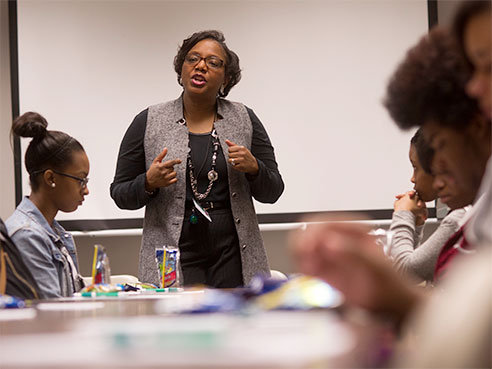 Tondra Loder-Jackson, Ph.D., director of the UAB Center for Urban Education, gives these 10th graders advice on how to one day become a teacher.The University of Alabama at Birmingham School of Education recently greeted several bright-eyed 15- and 16-year-olds to expose them to a broad range of K-12 and higher-education careers.
Tondra Loder-Jackson, Ph.D., director of the UAB Center for Urban Education, gives these 10th graders advice on how to one day become a teacher.The University of Alabama at Birmingham School of Education recently greeted several bright-eyed 15- and 16-year-olds to expose them to a broad range of K-12 and higher-education careers.
Fifteen sophomores from Parker High School, many of whom hope to become urban educators, met the School of Education dean and faculty, attended classes, chatted with education majors, and got a hefty helping of advice.
“We believe it’s critical to begin preparing urban educators as early as possible in their professional trajectory,” said Tondra Loder-Jackson, Ph.D., associate professor of educational foundations and director of the UAB Center for Urban Education. “This means that we must ensure that high school students who aspire to work in the education field can successfully enter into and complete college. Conversations about college and meaningful exposure to campus life need to begin as early as possible.”
The visit was implemented in partnership with the School of Education, Center for Urban Education, Birmingham City Schools, Birmingham Education Foundation and the Parker High School Academy of Urban Educators advisory board. The Academy of Urban Educators is one of six BCS career academies; it is unique in its focus on education careers.
During the visit, students also participated in campus tours, a library research session, a college admissions session, faculty job-shadowing, and career and academic speaker panels.
“The students appeared to be most excited about participating in education courses with other college students and faculty,” Loder-Jackson said. “I don’t think they were expecting to be fully integrated into the college lesson. But I gave our faculty advance notice so that they could modify their lesson plans to engage high school students without compromising content for college students.”
| “Students who come from families and communities where there is not a high rate of college degree attainment must be exposed to college as early as possible. They need to know that college is a realizable goal.” |
And 10th grade is not too early to begin, she says.
“Students who come from families and communities where there is not a high rate of college degree attainment must be exposed to college as early as possible,” Loder-Jackson said. “They need to know that college is a realizable goal.”
Ultimately, the hope is to scale up this experience into an early college program that will enable high school students interested in teaching careers to enroll in School of Education classes, she says.
“Demographers forecast that the United States and its public schools will become increasingly diverse within the next 15 to 20 years. This means we can expect more racial, ethnic, cultural and linguistic diversity across a variety of school settings, but especially in urban schools. Therefore, we believe it’s critical to begin preparing urban educators as early as possible.”
The Center for Urban Education has been committed to preparing urban educators for more than 10 years.
“To date, our work has focused on UAB undergraduate and graduate students, but we are excited about the prospect of expanding our focus to include high school students.”
